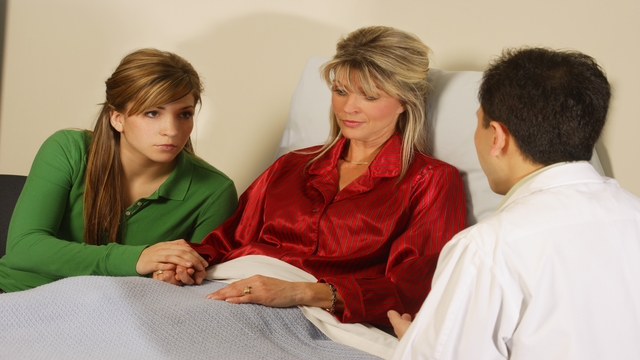 Design Pics/PhotoSpin
Design Pics/PhotoSpin
Being a caregiver to someone you care about with cancer can strengthen your relationship, but the journey can also be harrowing. It’s easy to feel overwhelmed and disjointed, but asking questions, organizing a network of caregivers and using online tools can help you gain back a sense of control.
No question is a dumb question in this situation, so if you have concerns don’t be afraid to address them with the care team. Start by asking the doctor and nurses about what to expect from the disease and treatment.
Cancer treatment generally follows a specific schedule. For example, most radiation therapy is given outside the body with daily treatments for a period of weeks allowing the treatment dose to build up to eliminate the cancer.
During this time, side effects from the treatments build up too, so you’ll want to know how the radiated area will change your loved one’s skin and how to protect the treatment area from sunlight and chafing.
Sometimes radiation is given internally, by mouth or into the veins. Internal radiation therapy (IRT) typically occurs with people being treated for non-Hodgkin’s lymphoma or thyroid cancer, although it may be used to treat head, neck, breast, uterus, cervix, prostate, gall bladder, esophagus, eye and lung cancers.
IRT may be administered alone or along with external radiation treatments.
Caring for a person undergoing IRT can be tricky. You will get a list of precautions that can include good hand washing, washing linens and clothes of the patient separately, double-flushing toilet wastes and avoiding close contact with children, pregnant women or pets who may be more at risk for harm from low dose radiation.
The medical staff will alert you to other safety measures needed if the patient is receiving high-dose therapy.
With IRT, the patient will give off radiation while the radiation source is in place, according to the National Cancer Institute.
Brachytherapy is one type of IRT in which the radiation source is a solid implant placed inside the body, in or near the cancer cells for a period of time and then removed.
Once the implant is removed the patient’s body fluids (urine, sweat, and saliva) will not give off radiation.
However, if the treatment is administered through an IV in liquid form, his or her body fluids will give off radiation for a while.
With chemotherapy, you’ll want to know what side effects to expect specific to the drugs being given:
• Ask how the drug will affect your loved one.
• Pick up all the drugs the doctor has ordered and ensure that they are taken as directed.
• The doctor will likely order medication to help counter side effects.
Chemotherapy often leaves the body through the kidneys and gut. Toilet waste should be flushed twice. The patient’s clothes and linens should be washed separately from the family and any body waste should be cleaned with gloved hands and then double-bagged.
Most chemo taken at home is in pill form and should be kept away from anyone in the home. If the patient is taking chemo at home through a vein, you should be given a spill kit and provided with instructions about safety and clean up issues.
Being a caregiver to a cancer patient can be physically and emotionally demanding, so having good information and being organized will be your best help.
• Create a circle of caregivers to help you and your loved one. This will support good health for everyone.
Caregivers need to take time to rest so they can be at their best to support their loved one during this challenge.
• Use technology to help organize your resources and to-do list. Here are two that can save you time and effort:
- www.mycancercircle.lostahelpinghands.com/caregiving/home is a mobile app for contacting the caregiving circle with appointment notifications, updates, emails and photos.
- www.caringbridge.org is an online tool to securely update information on your loved one's status and organize your caregiver team.
While challenging, being a caregiver during the cancer experience can bring you closer to your loved one and create lasting memories. It’s proven that having a strong network of family or friends is good for our well-being, says leading caregiver advocate Dave Balch.
He says that sometimes it takes work to nurture those ties, but it is well worth the effort to have someone you can turn to for advice, share good times with, and lean on when you’re in need.
For his caregiving tips, visit https://www.humana.com/learning-center/health-and-wellbeing/healthy-living/caring-coping/ and read his articles on EmpowHER https://www.empowher.com/users/dave-balch/
Lynette Summerill is an award-winning writer and Scuba enthusiast who lives in San Diego with her husband and two beach loving dogs. In addition to writing about cancer-related issues for EmpowHER, her work has been seen in publications internationally.
Sources:
Internal Radiation Therapy. NCI. Accessed online
http://www.cancer.gov/cancertopics/coping/radiation-therapy-and-you/page4
Caring for the Caregiver. NCI
http://www.cancer.gov/cancertopics/coping/caring-for-the-caregiver/page1
Family Caregivers in Cancer: Roles and Challenges. NCI.
http://www.cancer.gov/cancertopics/pdq/supportivecare/caregivers/healthprofessional/page1/AllPages/Print
What it takes to be a caregiver. American Cancer Society.
http://www.cancer.org/treatment/caregivers/copingasacaregiver/howtocareforalovedonewithcancer/caregiving-how-to-care-for-a-loved-one-with-cancer-toc
Treatments and Side Effects. American Cancer Society.
http://www.cancer.org/treatment/treatmentsandsideeffects/index
Caregiver Community. Caring for yourself, Stay Healthy. Humana.
https://www.humana.com/learning-center/health-and-wellbeing/family-and-relationships/caregiver/caring-for-yourself
The 11 Ls of Caring and Coping. Dave Balch. Humana. 14 December 2011.
https://www.humana.com/learning-center/health-and-wellbeing/healthy-living/caring-coping
Reviewed September 27, 2013
by Michele Blacksberg RN
Edited by Jody Smith




Add a CommentComments
There are no comments yet. Be the first one and get the conversation started!